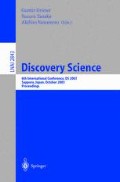Abstract
We present Scilog, an experimental knowledge base to facilitate scientific discovery and reasoning. Scilog extends Prolog by supporting (1) dedicated predicates for specifying and querying knowledge about scientific processes, (2) the different scales at which processes may be manifested, and (3) the domains to which values belong. Scilog is meant to invoke more specialized algorithms and to be called by high-level discovery routines. We test Scilog’s ability to support such routines with a simple search through the space of geophysical models.
Access this chapter
Tax calculation will be finalised at checkout
Purchases are for personal use only
Preview
Unable to display preview. Download preview PDF.
References
Collier, M.: A Land in Motion: California’s San Andreas Fault. University of California Press, Berkeley (1999)
DeMets, C., Gordon, R.G., Argus, D.F., Stein, S.: Current plate motions. Geophys. J. Int. 101, 425–478 (1990)
Jordan, B.: Global Plate Motion Models (2002), http://people.whitman.edu/~jordanbt/platemo.html
Jordan, T.H., Minster, J.B.: Measuring Crustal Deformation in the AmericanWest. Scientific American (August 1988)
Kuipers, B.: Qualitative Reasoning: Modeling and Simulation with Incomplete Knowledge. MIT Press, Cambridge (1994)
Langley, P., Sanchez, J., Todorovski, L., Dzeroski, S.: Inducing Process Models from Continuous Data. In: ICML (2002)
Phillips, J.: Representation Reducing Heuristics for Semi-Automated Scientific Discovery. Ph.D. Thesis, University of Michigan (2000)
Phillips, J.: Towards a Method of Searching a Diverse Theory Space for Scientific Discovery. In: Jantke, K.P., Shinohara, A. (eds.) DS 2001. LNCS (LNAI), vol. 2226, p. 304. Springer, Heidelberg (2001)
Valdes-Perez, R.: Machine discovery in chemistry: new results. Artificial Intelligence 74(1), 191–201 (1995)
Author information
Authors and Affiliations
Editor information
Editors and Affiliations
Rights and permissions
Copyright information
© 2003 Springer-Verlag Berlin Heidelberg
About this paper
Cite this paper
Phillips, J. (2003). Scilog: A Language for Scientific Processes and Scales. In: Grieser, G., Tanaka, Y., Yamamoto, A. (eds) Discovery Science. DS 2003. Lecture Notes in Computer Science(), vol 2843. Springer, Berlin, Heidelberg. https://doi.org/10.1007/978-3-540-39644-4_44
Download citation
DOI: https://doi.org/10.1007/978-3-540-39644-4_44
Publisher Name: Springer, Berlin, Heidelberg
Print ISBN: 978-3-540-20293-6
Online ISBN: 978-3-540-39644-4
eBook Packages: Springer Book Archive

